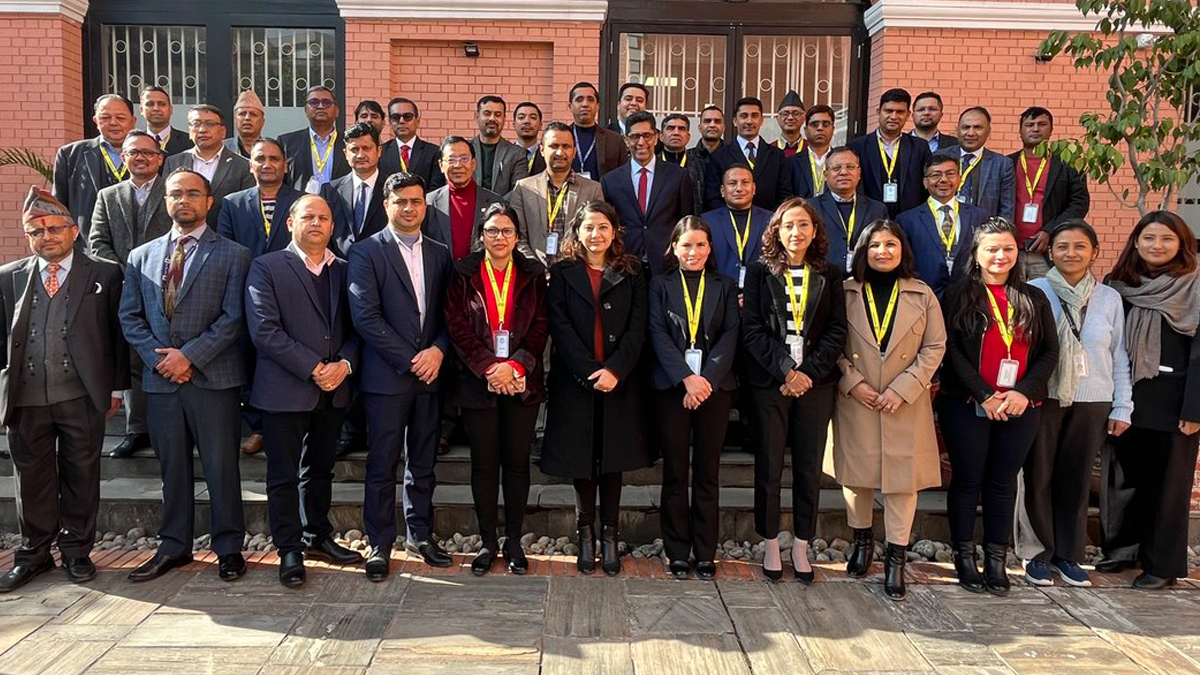
World Bank and Finance Ministry Collaborate on Sustainable Finance and Risk Management

In a significant stride towards fortifying Nepal’s financial resilience, the World Bank, in conjunction with the Ministry of Finance, orchestrated a comprehensive two-day learning event last week on the theme of “Managing Risks and Sustainable Finance.” The event attracted a diverse array of participants, including representatives from the Ministry of Finance, the Public Debt Management Office, the Financial Comptroller General Office, Nepal Rastra Bank, Nepal Bankers’ Association, Nepal Insurance Authority, Confederation of Nepalese Industries, and other professionals from the financial sector.
The central focus of the discussions revolved around derivatives instruments and the international experiences pertaining to the use of financial instruments in addressing various market risks, such as interest rates, currency fluctuations, liquidity concerns, and commodity price volatility.
One of the highlights of the event was the exploration of the benefits and essential steps in establishing a national hedge program from the perspective of fiscal risk management. Ram Pramod Yadav, Under Secretary at the Ministry of Finance, expressed keen interest in collaborating with the World Bank to conduct a detailed cost-benefit study. This study aims to evaluate the potential advantages of adopting a hedging mechanism as a strategic tool to manage financial risks effectively.
According to Yadav, the implementation of financial instruments in new projects on a pilot basis could play a pivotal role in helping both practitioners and policymakers comprehend the importance of structured approaches in mitigating risks arising from uncertain market conditions.
Technical support from the World Bank was a key point of discussion, encompassing the establishment of relevant knowledge exchange programs and an exploration of the various lending instruments offered by the Bank. Fabio Aparecido Da Silva, Sr. Financial Officer at the World Bank, emphasized the institution’s commitment to collaborating with the Government of Nepal in strengthening the country’s risk management strategies and establishing a comprehensive hedging program.
He underlined the necessity of developing a regulatory framework and building capacity to ensure that hedging strategies evolve into effective tools for managing risks. Bam Bahadur Mishra, Deputy Governor of Nepal Rastra Bank, welcomed the idea of implementing hedging mechanisms to address market volatility on commercial terms. He highlighted the significance of endorsing market-driven solutions to efficiently manage financial risks, foster sustainability, and navigate challenges, particularly given the country’s resource limitations.
Addressing another pertinent issue, Joseph Silvanus of Dolma Consulting pointed out that the absence of sovereign ratings contributes to the high cost of borrowing for Nepal from international financiers. He suggested leveraging the currency peg with India to address the absence of a transactable Nepali Rupee sovereign bond yield curve. Silvanus argued that this could be achieved by pricing many transactions based on the long-term Indian Rupee-USD curve, ultimately benefiting Nepal.
In conclusion, the collaborative efforts between the World Bank and the Ministry of Finance signify a step towards enhancing Nepal’s financial resilience and fostering sustainable financial practices. The potential adoption of hedging mechanisms and the establishment of a comprehensive risk management strategy could play a crucial role in navigating the complexities of the global financial landscape and securing the nation’s economic stability.
- Health Insurance Now Covers Nearly Half of Gandaki Province’s Population
- Mercure Kathmandu Extends Financial Support to Cancer Care Nepal
- DRRMNC Urges Swift Action to Tackle Forest Fires and Accelerate Reconstruction Efforts
- Nepal Observes People’s Movement Day to Commemorate Restoration of Democracy











Comments